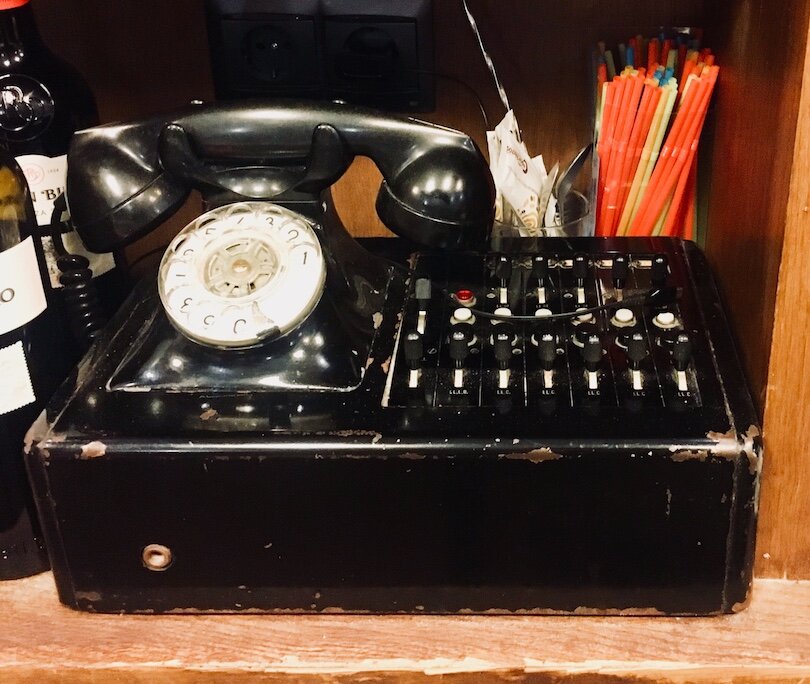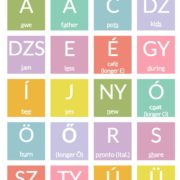23 Awesome Hungarian Words that Don’t Exist in English
If we had to name reasons to adore and learn Hungarian, its subtle descriptions and refined distinctions for the simplest things would definitely be high on our list. The language sometimes throws words at you for situations, personal traits and actions you weren’t even consciously aware of so far. At other times, you’ll realise that you just learned a new vocab you were often desperately looking for in English.
After reading our favourite 23 words that do not exist in English, you’ll find that it can definitely fill some gaping holes you might’ve felt in other languages so far. Here we go:
1. Szerelem (n.) – Romantic Love
The Hungarian Language has two separate words for love. One of them – szeretet – you can feel towards everyone. You can szeret your children, your dog or your life. But this special word – szerelem – is a feeling only reserved for your partner or the person you want as your partner. You can definitely not szeret your dog with szerelem! But you can still szeret your partner, though – with szerelem, ideally. Hope you get the idea!
Example Sentence: Csodálatos szerelem; tiéd vagyok, kedvesem. [First line of Bëlga’s (very ironic and funny) song “Szerelmes vagyok”]
Meaning: Wonderful romantic-love; I’m yours, my darling.
Literally: Wonderful romantic-love; yours am-I, darling-my.

Lots of “szerelem”-locks
2. Tutyimutyi (n. & adj.) – a Weak-Willed Person who Fears Every Action
A tutyimutyi person is a person with a weak will and a certain inability to take action. He moves super carefully through life and is constantly scared of making mistakes. But tutyimutyi is even more than that – it also refers to the physical behaviour of that person – his movements are rather careful but still inept. And since he fears to make a wrong movement this is exactly what happens all the time. Yes, you guessed right: Being tutyimutyi is certainly no desirable trait!
Example Sentence: A tutyimutyi ember csak akkor csinál bármit is, ha ráparancsolnak.
Meaning: A tutyimutyi person will only do anything if someone commands him to.
Literally: The tutyimutyi person only then does anything, if on-commanded.
3. Elvágyódás (n.) – The Desire to Get Away from where You Currently Are
If you know the word “wanderlust” you’re already close to the Hungarian “elvágyódás”. But while wanderlust describes the concrete desire to travel, “elvágyódás” is not really about travelling, but the feeling of wanting to get out and away. It’s not as energetic and doesn’t have zest for action wanderlust has and is not necessarily about a place. You can also “elvágyódni” in another time or era. All in all, it’s a rather melancholic feeling of missing something that you’re not sure about where in the world to find and wanting to escape your current reality. Sigh.
Example Sentence: Él bennem egy állandó elvágyódás a jelenből térben és időben.
Meaning: There is a constant feeling inside of me that I want to get away from the present – in space and in time.
Literally: Lives inside-of-me a constant wanting-to-get-away-feeling the future-out-of the time-in and space-in.

4. Aranyhíd & Ezüsthíd (n.) – The Reflection of the Setting or Rising Sun and Moon in the Water
Let’s stick to the romantic stuff. Aranyhíd literally translates to “golden bridge” and is as romantic as it gets. A beautiful word, though! It describes the reflection of the rising or setting sun in the water which actually looks like a glittering bridge spanning across the two banks of a lake or river. You can catch the most beautiful golden bridges in Hungary at Lake Balaton – you will almost feel like at the sea with the right mindset. See for yourself below!
The term for the reflection of the moon on the other hand is “ezüsthíd” which literally means silver bridge. Isn’t that lovely?!
Example Sentence: Az aranyhíd a nap tükröződése a vízen, amely fényes sávot képez az egyik parttól a másikig.
Meaning: A golden bridge is the reflection of the sun in the water which creates a shiny path from one bank to the other.
Literally: The golden-bridge the sun reflection-of the water-on, which shiny path(acc.) generates the one bank-from the other-to.

Aranyhíd at Lake Balaton
5. Báty, Öcs, Nővér and Húg (n.) – Four Shades of Siblings
In Hungary, we don’t say elder or younger brother or sister. We instead have a separate word for each of them. Your “báty” is your elder brother and your “öcs” or “öcsi” is the younger one. Your elder sister is your “nővér” (which is also the word for nurse, by the way) and – you guessed right – your younger sister is your “húg”. The word for sibling on the other hand is “testvér”, literally translating to “body-blood”. A typical example for three words with one stone!
Example Sentence: A húgom (öcsém / bátyám / nővérem) a legjobb barátom.
Meaning: My younger sister (younger brother / older brother / older sister) is my best friend.
Literally: The younger-sister-my (younger-brother-my / older-brother-my / older-sister-my) the best friend-my.
6. Hiányérzet (n.) – The Feeling that Something that You Cannot Really Name is Missing
Hiányérzet describes a feeling of missing something that you cannot really pinpoint. Imagine you just read a book that was good, but somehow not outstanding. If someone asks you what you didn’t like about it, you cannot even tell – you missed something – maybe a better ending or better characters. That’s when you have “hiányérzet”.
I’m sure you know that feeling when you just packed your backpack and left the flat for your next travel, but you have the feeling and you’re almost sure that you forgot something. That’s another kind of “hiányérzet”. It’s the intuition that something’s missing, but you are not sure, what.
Example Sentence: Hiányérzetem van; tuti otthon hagytam valamit.
Meaning: I have hiányérzet; I’m sure I left something at home.
Literally: Hiányérzet-my is; sure at-home left-I something(acc.).
7. Káröröm (n.) – The Happiness About Someone Else’s Harm / Misfortune
Do you know that feeling when you are secretly happy if something bad happens to someone else? Don’t worry, you’re not the only evil person! Seems like lots of Hungarians felt the same and therefore created an own word for for this: “Káröröm” literally translates to “damage-joy”. It’s usually accompanied by the feeling of envy though – don’t we wish only bad luck to those who are usually on a lucky stream their whole entire life and rub it in our faces the whole time?!
Example Sentence: A legszebb öröm a káröröm.
Meaning: The greatest joy is “damage-joy”.
Literally: The most-beautiful joy the damage-joy.
8. Elmosolyodik (v.) – The Act of Starting to Smile (in a Really Subtle Way)
“Mosoly” is the word for smile, but to “elmosolyodni” is something a lot more subtle than a full, bright smile. It’s rather a microexpression forming around your lips which usually happens when you didn’t find something funny in the first place, but somehow still can’t help but smile at the end.
Example Sentence: A végén mégis elmosolyodtam.
Meaning: In the end, I had started to smile after all.
Literally: The end-on, nevertheless started-to-smile-I.

She just had to elmosolyodni at the end.
9. Bezzeg (adv.) – A Filling Word You Use When You Name Examples of How Others Were Treated Differently Than You (Unjustly)
“Bezzeg” is super hard to describe and we’re actually struggling as we’re writing this, so if you can come up with a better explanation, don’t hesitate to comment it!
Anyways, here we go:
Let’s say a colleague of yours gets a salary raise and you don’t – unjustly, as you feel. In Hungarian, you would tell your friends something like “I didn’t get a raise, bezzeg my colleague did!” In this case, “bezzeg” would be similar to “but”, but in English you would need a certain tone in your voice to make your dissatisfaction clear. Bezzeg already bears this negativity of being treated unjustly.
But bezzeg can also mean so many things more – Hungarians use it to highlight certain claims or to teach a lesson in a subtly teasing way, as in: “You didn’t want to date me back then, bezzeg now that I became famous you do!” Here again, it’s similar to “but”, but bears a certain kind of negativity and has an educational tone.
Then there is also the verb”bezzegezik” (to “bezzeg”) which means to frequently and repeatedly say “bezzeg”, meaning that you can’t stop comparing your situation to others’ and feel that you’re worse off. But it can also mean that simply everything is bad nowadays, as compared to the past: “Bezzeg 20 years ago people were more polite!”, “Bezzeg when I was young, everything was more affordable!” The latter is mostly done by older people, who cannot accept that life changes over the years.
This is one of those words you probably need to get a certain feeling in order to use it correctly.
Example Sentence: Már megint nem kaptam fizetésemelést, bezzeg a kollégám kapott.
Meaning: I didn’t get a salary raise again, but my colleague did, of course.
Literally: Again not did-get-I salary-raise(acc.) but-of-course(ironic) the colleague-mine got.
10. Mentegetőzik & Szabadkozik (v.) – To Explain Oneself After a Lazy or Improper Behaviour
Here is a prime example of even two Magyar words for which English has none: “Mentegetőzik” and “szabadkozik” both mean the same thing: the attempt to explain oneself after behaving improperly or conducting a lazy work or being accused of such.
We all know that situation when you call someone on their faults and mistakes and that person starts to come up with a thousand words and excuses for why he has done things that way. Still, in the end, none of the excuses is legit and a weird and awkward situation emerges.”Mentegetőzik” and “szabadkozik” are the words for describing this chain of explanations, words and excuses.
You can “mentegetőzni and “szabadkozni” also legitely, though! That happens when someone accuses you for behaving improperly, like talking behind someone’s back or doing lazy work, although you are not actually guilty of any of this. To explain yourself, even if you haven’t done anything wrong is another form of “mentegetőzni and “szabadkozni”.
Example Sentence: A kollégám állandóan csak mentegetőzik / szabadkozik, ahelyett, hogy rendesen dolgozna.
Meaning: My colleague is constantly excusing himself instead of working properly.
Literally: The colleague-my constantly only excuse-himself, instead-of, that orderly working-would-he.
11. Nincs & Sincs (v.) – The Words for Non-Existence
Nincs & sincs both fill a gaping hole by describing the same and – as far as we know – only exist in Hungarian. Nincs means the lack of something, while sincs describes the lack of something further. They literally translate to “there isn’t something” and “there isn’t that other something either”. Confused? The following example will do the trick:
Example Sentence: -Van kávé? -Nincs. -És tea? – Az sincs.
Meaning: -Is there coffee? -No, there isn’t. -And tea? – No, there isn’t tea either.
Literally: – Is there coffee?- No, there isn’t. -And tea? -That isn’t either.
Note that both nincs & sincs also have a plural, which are “nincsenek” & “sincsenek”. In that case, you’re referring to the lack of multiple things, and multiple further things.
12. Irgum-Burgum (interjection) – An Expression of Playful Anger, mostly Used with Children
We love irgum-burgum – it’s such a nice and playful word! It’s one of the so-called Hungarian interjections and is a word of simulated anger and one for an empty threat. If your child behaves improperly, you will call on him saying irgum-burgum! What you actually mean is “stop doing that, right now”, but your tone will reveal that you actually cannot be angry. We have no idea of the origin of the word, but if you say it out loud it sounds like the humming of a bear. Awesome!
Example Sentence: Irgum-burgum, mindjárt megharagszom.
Meaning: Irgum-burgum, I’m gonna be mad soon.
Literally: Irgum-burgum, soon mad-going-to-be-I.
13. Piszmog (v.) – to Work only Seemingly and without a Real Purpose
This is probably the colleague that gets on the nerves of everyone. We all know that person in the office who spends half of his working hours on facebook and is busy but not productive the other half. Still, nobody really seems to notice, because he or she is hiding this pretty well. That’s exactly the act of “piszmogás” – to always keep up appearances but actually not contributing anything useful work-wise. To “piszmog” doesn’t always happen on purpose, though – some people are just too detail-oriented and get lost in the unimportant things way too much, so that they are simply incapable of working productively and in a result-oriented way.
Example Sentence: Ne piszmogj, dolgozz rendesen!
Meaning: Stop piszmog-ing and start working properly!
Literally: Not piszmog-you, work-you properly!
14. Bumfordi (n. & adj.) – Someone who is Slow and Inept in Both Mind and Physical Movement
Bumfordi is another word you definitely shouldn’t aim for. It describes someone whose movement is inept and slow, while his or her mind is mostly not the sharpest, either. It’s used for people who simply cannot get it right – neither mentally, nor physically. This doesn’t mean that they have bad intentions but somehow they were among the last when dexterity and savvy were distributed.
This word is also often used for people, animals or things that are simply huge. A dog can be bumfordi, as well as a 2m-high and 1m-wide person. And even a big cupboard from grandma’s times.
Example Sentence: Egy bumfordi folyamatosan rálépett a lábamra a buszon.
Meaning: A bumfordi was constantly stepping on my feet on the bus.
Literally: One bumfordi constantly stepped the feet-my-on the bus-on.
15. Nebáncsvirág (n.) – A Super-Easily Offended Person
A “nebáncsvirág” officially is a touch-me-not plant, but in Hungarian, this botanical term literally translates to hurt-me-not-flower. As you sure have thought thought, Hungarians don’t only use the term in its botanical sense. A “nebáncsvirág” is also a person, who is offended super-easily, starts crying really quickly and is simply not made for this cruel world that we live in. We use it also for people who blush really quickly and don’t have a sense for dirty jokes and humour.
Example Sentence: A kis nebáncsvirág azonnal sírva fakadt, amikor emelt hangon szóltak hozzá.
Meaning: The little hurt-me-not-flower started to cry instantly, when someone talked to her with a raised voice.
Literally: The little hurt-me-not-flower instantly cry started, when elevated voice-on talked-they to-her.
16. Kertel (v.) – to Talk Your Way Around Something; to Avoid the Answer to a Certain Question
To “kertel” literally means to garden – we guess this means that instead of doing the house, you do the garden and don’t get to the core of things. A person who “kertel” will answer a very simple question with 100 sentences of which none will make actual sense. Another way of “kertel” is to constantly change the topic and avoid a certain issue. A very popular and common activity among politicians!
Example Sentence: A politikus kertel, amikor a tavalyi választási ígéreteiről kérdezik.
Meaning: The politician is kertel-ing, when asked about last year’s election promises.
Literally: The politician kertel, when the last-years election-y promises-of ask-they.
17. Pihentagyú (n. & adj.) – A Person Who Has a Very Tiring Sense of Humour
We all know that person who tells super lame jokes all the time and never seems to tire of them? In Hungarian we have a word for them! Pihentagyú literally translates to “well-rested brain”, probably meaning that these people’s brains will never get tired of their own jokes. Still, they will know how to tire you very quickly and effectively.
On the other hand, a pihentagyú person is also known for finding somehow weird but innovative solutions for everything – they simply think in a way other people probably wouldn’t. The term is not entirely negative after all – somehow, everyone needs a pihentagyú person in their lives.
If “pihentagyú” is too long for you, you can simply go with “pihent” which means “rested”. You can apply it to tiring jokes, tiring people and everything else that is just lame but somehow still funny.
Here are 19 things only a pihentagyú person would do – they will sure give you a good idea about what this term is all about!
Example Sentence: A pihentagyúak mindenből viccet tudnak csinálni és mindenre van megoldásuk.
Meaning: The pihentagyú persons can make a joke out of everything and they have solutions for everything.
Literally: The pihentagyú-s everything-of joke(acc.) can-they make and everything-for have solutions.
18. Megcsörget – To Ring Someone on Their Cell only Once So That they Call You back and You Don’t Get to Spend Any Money
With ever-decreasing call-prices and free roaming this is a rather diminishing term but trust us – it played a really big role a few years ago! To “megcsörgetni” someone means to ring their cellphone only once or twice and hope for a call back, so that the ringer doesn’t get to spend any money on minutes.
Fun fact: a few years ago, you could even send a free text message to someone asking for a ringback. Very popular at times when most of us went with pre-paid SIM-cards!
Example Sentence: A barátom már megint csak megcsörgetett – biztos nincs már pénz a telefonján.
Meaning: My friend just “megcsörget” me again – I guess he doesn’t have any money left on his phone.
Literally: The friend-my again just rang-me-up – sure there-is-no money phone-on-his.

good times…
19. Ügyeskedő (n.) – A Master of the Art of Living with Sometimes Questionable / Shady Methods
Do you know these people who somehow always have money but never work? Who always manage to sneak through life somehow, but nobody knows exactly what and how they are doing it? Their ingredients are usually really good social skills, a dash of wit, the art to twist people around their finger and dexterity. A dexterous person is exactly what “ügyeskedő” literally translates to. They are likeable but shady, outspoken but mysterious and always right at or across the border of the law. The term is somewhat similar to the English “wangler”, except that an ügyeskedő is not necessarily someone who works with deception, although it can be one part of his methods. It’s rather about smuggling your way through life with many shades of grey, a pinch of black, little effort, cleverness and dexterity.
Example Sentence: Egy ügyeskedő mindig talál magának utat ott, ahol más nem.
Meaning: An ügyeskedő always finds a way, where others wouldn’t.
Literally: An ügyeskedő always finds for-himself way there, where other not.
20. Rosszarcú (n. & adj.) – A Person with an “Evil Air”
“Rosszarcú” literally translates to “bad-faced” and describes a person who simply looks dodgy. You can see on his face and in his expressions that he’s felon, although you don’t know exactly why you would think that. These people simply have a creepy air around them that you cannot really pinpoint – you just hope that you won’t meet them on the dark streets alone, at night.
Example Sentence: Ne menj abba az utcába, mert tele van rosszarcúakkal!
Meaning: Don’t go down that road because it’s full of “rosszarcú-s”.
Literally: Not go-you in-that the street-in, because full is rosszarcú-s-with!
21. Meghazudtol (v.) – To Make Someone Appear as a Liar by Lying about what they Did or Didn’t Say
Sounds confusing? Because it is! This is one of the expressions I really-really miss in English. Luckily, it isn’t something I have to use often but when I do I’m angry and in search for words.
To “meghazudtol” someone means to lie in the face about what a person did or didn’t say. Imagine that you ask a friend of yours to not mention one specific topic in front of your girlfriend or boyfriend. For example a thing from your past you aren’t proud of or a girl or boy you used to have a crush on. The first (or second) thing he or she does when the three of you meet is to start talking exactly about that very topic. When you get angry and call them upon this later, they outright deny that you ever asked them to not talk about that issue. That’s when your friend is “meghazudtoling” you. He betrays you by lying about what you both know you asked him for. I’m sure you know what I’m talking about. It’s a word you need in a really fierce and emotionally loaded situation – I’m actually a bit passive aggressive as I’m writing this.
Example Sentence: Egy igazi barát soha nem hazudtolna meg.
Meaning: A real friend would never meghazudtol you.
Literally: A real friend never not hazudtol-would-you meg.
22. Szöszmötöl (v.) – to Do Something Lengthily and with Uttermost Care
Do you know that feeling when you get so entirely lost in the details of your action that you stop seeing the bigger picture? That’s when you szöszmötöl. A really good example for that would be to try solving a technical problem – you get from one issue to the other which in the end leads to a whole labyrinth of little things to solve and the next thing you know is that you’ve been sitting there for hours without actually being closer to the solution of your original problem. Who doesn’t know that situation? We most certainly do and think that everyone is somehow prone to szöszmötöl every once in a while. The good news though is, that a few hours os szöszmötöl-ing will teach you a lot in the end, even if it feels like utter frustration at first.
Example Sentence: Órákig szöszmötöltem, és mégsem sikerült megoldanom.
Meaning: I was szöszmötöl-ing for hours and still couldn’t solve it.
Literally: For-hours szöszmötöl-did-I, and still-not managed solve-I-it.
And now it’s your turn: We want to make this list as complete as possible, so don’t hesitate and give us every Hungarian word you know and love because it fills a gap in English. Let’s all learn from each other!
Is there a word in this list that exists in your mother tongue (if it’s not English)? Shoot it below!










Bezzeg – 100% accurate description, I was laughing so hard while reading, thank you!
@tethova – You’re welcome!! We’re glad you like it! 🙂
And my favourite word: szomszédol, which means going over to neighbours’ to chit-chat a bit. AKA: neighboring.
Awesome word; great addition!! Thanks for sharing it! 🙂
Bezzeg az én időmben!
Bezzeg in my time people didn’t wear such outfits.
Descriptions are sport on. Wonderful collection.
How would you explain the phrase: Akasztják a hóhért.
Thank you so much, Tinyo!! We’re so glad you like it 🙂
Akasztják a hóhért literally means to “hang the hangman” and it’s a proverb used when someone who usually has the upper hand in a situation suddenly becomes the one with the lower hand – the inferior one.
A good example for “Akasztják a hóhért” is when a dentist has to go …to the dentist!
It’s more a Transylvanian Hungarian, but my absolute favorite: ejsze 🙂
Cool, thanks @András!! We have to admit, that we don’t even know that word! :)) Can you explain it?
Ejsze means something like : Now, you are implying that ….. or, depending on the context: it looks like …..
It is a kind of “talán”( maybe).
awesome, thanks!! 🙂
And the “berezel”?
True, Maja, doesn’t exist in English, either 😉
In English we do have an equivalent for Káröröm which is scheffenfraude, but it’s a recent loan word from German
Hey Loren, thanks for your comment! We know of the German “Schadenfreude”, but didn’t know it’s used in English, too?
Yup! Most people will recognize schadenfreude if you use it. We also have sadism but that’s taking joy in actively hurting others, so it’s a bit different.
Thanks, didn’t know! We hope káröröm still counts though 😉 As for sadism, that we have, too – it’s szadizmus and means the same as it does in English. But yeah, that’s a more action-oriented thing than káröröm 😉
I’ve never heard “scheffenfraude,” but “schadenfreude” has been borrowed from German and is now more or less an English word.
‘Hoist with his own petard’ comes pretty close. And one of the English comments above is just plain wrong: descriptions are not ‘sport on’; should be ‘spot on’
Love these! While reading about ‘bezzeg’, I tried to think of what we would say in English in that sentence, and for me the most common substitute would be ‘but, of course’…. When used in the middle of a sentence it gives the impression of irritation or frustration that ‘but, of course, they got a raise’ or ‘but, of course, her application was accepted’ in contrast to me (or whomever).
Hey Ruth, thanks for your comment!! 🙂 Yeah, it’s quite similar to “but, of course…” – that’s also, what we would compare it to most. The only difference is that “bezzeg” in itself is negative and to “but…” you have to add a certain tone to make your jealousy, disappointment, etc. clear.
How about using “yet” to replace “bezzeg”? It has a little more bite to it than using “but”, doesn’t it?
I agree, “yet” could work for this specific sentence but it doesn’t work for many other sentences with “bezzeg” in it.
How would you say this sentence for example:
Bezzeg az én időmben! / Bezzeg in my time!
I always struggle to translate these for my english speaking friends.
What are you thinking about ‘málészájú’? And ‘tedd-ki-a-hidegre-hagy-hűljön’?
Hey Kati, love “málészájú”!! 🙂 Thanks for adding it. Can’t think of an equivalent English word. I don’t really use “tedd ki a hidegre…” to be honest – in which context would you say it? 🙂
Meghazudtol also has a positive side. When someone thinks you can’t do something, but you prove that you can. We say then: Meghazudtolja önmagát/ proves him or herself.
I liked the list, thanks 🙂
Oh yes, you are right! Didn’t think of that…
Somehow I mostly use meghazudtol in a negative connotation, don’t even know why 🙂
Thanks for commenting!
I’ve never heard this expression used in the context you described.
https://wikiszotar.hu/ertelmezo-szotar/Meghazudtol
https://www.arcanum.hu/hu/online-kiadvanyok/Lexikonok-a-magyar-nyelv-ertelmezo-szotara-1BE8B/m-3C77D/meghazudtol-3DD52/
I also think it means when someone calls you a liar to your face, when you both know that he is the one lying.
Agree! 🙂
I always thought that Pihentagyú means stupid ?
Hey Judy! I personally never used it as stupid, for me it was always these tiring people with a really weird humour… ? 🙂
I knew “szerelem” would be up there on the list. 🙂 “Bezzeg” is also a great find, I never thought about that until now. “Káröröm,” though strictly speaking doesn’t exist in English, is the literal translation of the German word “Schadenfreude,” which is sometimes also used in English for lack of their own word.
“Nincs” also doesn’t exist in English, but it is not unique to Hungarian, either. Korean has a similar word 없다, which expresses the lack of something.
Cool, thanks for your comment!!:) That’s so interesting, didn’t know “nincs” exists in Korean! Do they have “sincs” as well? Probably other Asian languages have an equivalent, too?:)
Great, super fun post! One addition: “anyósülés”, mother-in-law-seat. The seat next to the driver 🙂 Its from the german word “schwiegermuttersitz” which refers the times when the second seat of the car was small, uncovered and uncomfortable 🙂
haha, right, really good! I think it’s also called that way because it’s the most “dangerous” seat and that’s where you’d want your mother-in-law to sit 😉
Anyósülés = shotgun (seat)
How about ‘csendèlet’ and ‘ripacs’? I never find a proper word for them…
Hi Rita, I think “csendélet” (in an artistic sense) is simply still-life? Or do you use it in another way, too?
Ripacs is really good – I admit I had to google it, though! But it’s similar to “hatásvadász”, right? I’m definitely gonna remember this :)) Thanks!
Ripacs is a ham (theatrical, exaggerated, loud).
hi! Great post 😀
I would say grammaticaly we use “bezzeg” similarly to “on the other hand” / “compared to” , but you’re right, it always suggests that the thing/person/happening we compare to is _better_ 😀 typical hungarian… :DD
Piszmog and szöszmötöl is kind of the same I think – doing something small, tedious, that takes long, but without obvious results. I think I read in one of Douglas Adams’ books the phrase “mocking around” that was translated to “piszmogás” 🙂
I think you can say “opportunistic” to “ügyeskedő”. It’s not exactly the same, but I feel fairly close.
had such a good laugh at “domestic dragon” :DDD it has to be used carefully 😀 you know the pair of a domestic dragon? it’s “slippers” – “papucs” 😀 the man who does everything as his lady tells him and always gives her right. 🙂
cheers
Hi Joe, thanks so much for your nice comment 🙂
I feel that “piszmog” happens more on purpose and consciously, as “szöszmötöl” does, but yeah, they are kind of similar!
I found “wangler” for ügyeskedő but don’t know how often this is actually used. So yeah, opportunistic might come even closer.
And of course I know papucs!! 🙂 Great addition!
I loved this: I also have one: Rinyavas the hanger above the car door that you hold when you panic in the car.
Nincs also exist in Chinese 没有
Hazisarkany often referred to your mother in law, while ürge is a not too sympathatic man.
hahahaha Medea, I know what you mean by rinyavas, but didn’t know there was this word for that! I was laughing really hard 😀
In English we call rinyavas “the oh shit handle”.
He was driving the car so recklessly I was white knuckling (holding very tightly) the oh shit handle.
It is called “majrévas” in the north-west.
Elfogyott /elfogyni. I always have to think about it in English. The problem is that the actor in the expression changes : in Hungarian it is my shampoo that does the act of not being there anymore, while in English it is me who run out of shampoo.
true, Nell!! Great word! Yeah, its run out or go out in English, but never thought about the fact that the subject changes! Thanks! 🙂
You just simply say it is finished.
Btw while I think szerelem, bezzeg and nincs are unique to Hungarian language structure, things like rosszarcu or házisarkany are rather funny word-construct, the kind that every language(that has összetett szavak) has, just maybe not for the exact same things. Eg English has bridezilla.
That’s true, of course 🙂 Every language has its unique and funny words and I’m sure there could be a list with similar words that don’t exist in Hungarian or any language A to language B. Still, I think it’s fun to gather these words in one place. Bridezilla is awesome, btw 😀
The Hungarian title for the film is “Menyasszörnyek”, literally: “bride-monsters” or in this context it could be “bronsters”, huh.
Itthon – otthon
Thanks Limpi! 🙂
You’re welcome! 🙂
Here’s another one (it’s gonna be tricky).
Try to explain “tieidéi” to someone in one sentence. 😛
“Ezek az én gyerekeim játékai vagy a tieidéi?”
Haha, that’s indeed tricky. But I would say “those of yours”?
Habzsolháp…?
Thanks Encsi; I don’t know that word – can you explain it? 🙂
It’s the name of the duck from the Hungarian tale Kukori and Kotkoda.
I never could translate ügyes. Not only ügyeskedő…
True!! When I want to say “ügyes vagy” I never know how to say it in English! Know what you mean 🙂
What do you end up saying? (This is one I always thought was such a great expression in Hungarian! Mostly used with kids, so can’t really say “you are so skilled!”)
I always thought of ügyes as clever.
Well done!
“Attaboy”
I think “megcsörget” is used more generally, not just when you have an intention to hangup after the first ringing. It only refers to the fact that although you called someone they haven’t answered.
(my friends at least use it like this)
Might be… I mostly know it from ten years ago, when we all had prepaid SIM-cards 🙂
Previous comment is right… we use it for an answered call… but u can also say Majd megcsörgetlek ha készen vagyok! – ill call u when i’m done.
Szőrös szívű
Good one! 🙂 It’s two words tho, unfortunately 😉
Actually it’s one word: szőrösszívű
Furry/hairy-hearted? Is that a positive thing, like “warm-hearted”? English has “warm and fuzzy,” meaning sweet or pleasant words or behaviors that make other people feel comfortable and happy. So a “furry heart” makes me think of someone who is good-hearted, who makes other people feel good.
Or maybe it means something else entirely? I’m just guessing.
szőrösszívű is a person, who actually has a negative attitude about you. Usually used in situations, when you want to change that person’s negative attitude, so it is not as offending as evil. (ne legyél annyira szőrősszívő – Do not be so szőrösszívú)
For example your father, who do not allow you to go out with friends…
I never found a good translation for “tehetetlen” . Anyone who has a solution for that?
I think powerless or helpless come probably closest, what do you think? 🙂
Unable to do anything ?
I’d say for tehetetlen you could usually use impotent.
I think Tehetetlen
I think Tehetetlen can mean “inept”, someone who’s just not good at figuring things out, or good at or accomplishing things
I could not find a word in English for “piszkavas”.
Isn’t that “keep digging”?
Hahaha, no, it isn’t. It’s a metal rod (iron=vas) you use to poke (=piszkál) the fire with.
Poker. Not the game, it’s also the English version of piszkavas.
Isn’t that a rabble? 🙂
Nahat! Such interesting words…
Köszönjük Katy! 🙂
Awesome read! Lots of good words; adding compound words opens up the list even further, eg “agyonettem magam” (thinking is this host now after dinner LOL)
I too was giggling away to myself while reading this list and agree that there are countless words and phrases in Hungarian which simply do not exist in English! Even though English is my main language and my Hungarian is not as fluent as I would like it to be, I still often stumble across situations during conversation in English where I can easily find Hungarian words to use, but cannot find their equivalent in English! This is why the local Hungarian community to me often throw Hungarian words into English conversation (and vice versa). It is so common that we even have a term for it – “Hunglish”! Hungarian is a wonderfully rich and descriptive language – especially true when a person can swear and curse for 10 straight minutes without repeating themselves!
Haha I agree! Not so easy keeping the language in a different country, right? I’ve been in the US all my life and I’m so grateful to my mother for speaking Hungarian with us at home… Still — and this happens too much with my little brother — we’ll mix English with Hungarian sometimes. You can’t help it, there’s only one woman in the household who was raised in Hungary and it’s my mother. I’d love to go back someday, though — I am very lucky to have had a great supply of Hungarian books so I’m halfway decent at reading and writing at least lol
P.S. Nahát is one of my favourites – how would you translate that, come to think of it?
And my grandparents use this phrase (please excuse any spelling or grammatical errors!) “valami nem stimmel” as in something is amiss or doesn’t add up – but what might “stimmel” translate to exactly!?
Wouldn’t “nahát” be “wow” or “whoa”?
Ohhh my grandparents also say that! You’re right… That makes me think…
…
I can’t come up with anything. I’m no linguist XD I think it’s just a colloquialism. I’m not entirely sure.
My grandmother also has the habit of saying ‘mink’ instead of ‘mi’ and ‘tik’ instead of ‘ti’. Not really on topic but village phrases i guess.
My great-grandmother thought ‘jockey’ was ‘csoki’, no matter how much my young mom tried to explain it to her!
And here in the US, my little brother and I thought the arcade Chuck E. Cheese was ‘csoki cheese’, and we hated it because chocolate cheese sounded disgusting!
nem stimmel is most likely a version of the german das stimmt nicht.
they have the same meaning, and hungarian has some loanwords from german (spórol/sparen, or spájz/speisekammer)
because of the austrian hungarian monarchy and the language reformation / nyelvújítás, hungarian has some phrases that use the same logic (even the expression for it does this with tükörfordítás/spiegelübersetzung), or words that were just taken from it with a written form according to the pronounciation rules of hungarian.
I guess “Stimmel” originally comes from German language and it simply means ‘right’ ‘ok’ (my German is pretty rusty though)
What about “bogáros”, or “kezzi-csokolom” or “hoszusáj” or “út” vs. “útsza”?
út vs utca is road vs street
Or “bírkaság” and “kusz-kusz” when a child/baby coughs!
Haha right, these are great! Especially kuc-kuc! 😀 we say it even among adults sometimes 😀
This was great, love my maternal language and learning more about it. Just one mistake. Yiu said nö ér means nurse. It does not . It means religious sister, as a nun. Nurse is ápolonö. But keep up these articles!
Sorry for typos that showed up. I was saying , “You said növér…”
Szia Lili,
thank you for your comment! Glad you like our page and content! 🙂
You are right, nővér can also mean religious sister or nun, but it’s also the word for nurse (along with ápolónő).
All the best,
Juli
Nővér or nővérke is actually the most common word we use for nurse… ápolónő is the official or ‘hivatalos’ word for it but in spoken language we are always looking for a nővér. It probably comes from the fact the elder sisters usually took care of the younger ones just like nurses take care of the ill.
nővér can mean all of those, and it depends on the context. nővér and ápolónő can be used interchangedly, but head nurse is more often called főnővér, unless its a man i guess
The káröröm has a translation.It is malicious joy. I would comlplete the list with the szusz. Ki hajtod belőlem a szuszt. You push the szusz out from me. Szusz is the last sigh or breath. We use it when someone makes us run or laugh. Another word on my list is the kuckò.It is a cosy, homy tiny place where you can feel at home and comfortably yourself.It is always small room. I would add the csemege(maybe snack) and álomszuszèk(sleepyhad),fene and franc words on my list as well.
By the way the szöszmötöl and piszmog have almost the same meaning.
What about the meg ?Is it a phrasal verb or preposition? Sometimes we write it after the verb. So how would you explain the meaning of the meg.?(eg. megeszi-eszi, megalszik-alszik,megfőz -főz, nyugszik-megnyugszik etc.)
Szia and thank you so much for these great comments!
1) all the words you listed are really great additions! Thanks for sharing them! I especially like “kuckó” – during this part of the year in particular. 🙂
2) The difference between “piszmog” and “szöszmötöl” is that “piszmog” has more malintention behind it. “szöszmötöl” is if you’re being caught up in unimportant details but not necessarily being aware that this is counterproductive.
3) I have written a whole mini lesson about “meg” – you can check it out right here. It shows you “meg” in its multiple functions as both a word in its own and a prefix: https://www.catchbudapest.com/hungarian-meg-mini-lesson/ Enjoy!
Best, Juli
magázódás, tegeződés ? English
kecmereg , kandikál
Szia Niki,
thanks, these are great additions! 🙂
I like “kecmereg”, in particular. Kandikál could be translated as “to peek” maybe?
All the best,
Juli
You’re right
All the best
Niki
Well, I think You missed the fun part regarding “káröröm” when you posted the example. The complete version is: ” A legszebb öröm a káröröm, mert nincs benne irigység.”
“The greatest joy is damage-joy because there is no envy in it”. Cute, isn’t it?
Also, there is a word in Hungarian that can have multiple meanings, as it can be a substitute of many “things …”: “izé”.
Hey there,
yes you’re right, the “long version” is even better, however I mostly go with the shorter one, but thanks for elaborating! 🙂
And “ízé” is a great addition too, thanks for sharing!
Best,
Juli
i would use thingie for izé
Regarding “ejsze” (mentioned by András) u should consult this, too: http://szekelymagyar.transindex.ro/
I can only say that if you’ll read that, than biztos hogy szétcincálja az agyadat! 🙂
Haha great one, thanks! 🙂 /Juli
Not sure this is right place to ask, but – my Hungarian mother in law would put her grand kids ( and their parents earlier, I’m sure)tenderly to bed with the expression (poorly phonetic attempt here,) “go choo choo nee”. Wondering about the meaning.
Ginny, I guess you mean “csucsulni”? 😉 It’s indeed a word for sleeping, albeit a little bit outdated.
Best, Juli
You probably meant ‘csicsizni’, ‘csicsikálni’ for sleeping or even better, cat-nap.
‘Csücsülni’ is ‘ülni’.
I love this page! Thank you so much for it. One question: Házisárkány made me laugh out loud, but I admit I was less enchanted to find it’s apparently only used for a woman. Is there an equivalent for my domestic dragon husband? 🙂
Szia Teresa,
köszönjük szépen!! 🙂 While there is no official word for a male domestic dragon, I (Juli) would definitely appreciate it! However, since dragons can have all genders, there is no reason not to use it for husbands, as well! 😉
Tök jó!!!!
This is something we said a lot with my friends when we were younger 😂
True!! We still say it! 🙂 “Pumpkin good!” 😉
Actually, in this sense “tök” is the shortening of “tökéletes”.
One if my fav words that sometimes even my Hungarian fellows dont get is ‘elhásmál’. It is a verb and it means eg you sleep in the bed and u move a lot at night that you totally disrupt and wrinkle the sheet under you. like “Peter always elhásmálja the bedsheet under him. He sleeps like a rollercoaster”.
Szia Zsófi!
Thank you! 🙂 I didn’t know this word – in which dialect is it in use? Best, Juli
elkámpicsorodik
elbátortalanodik
elszontyolodik
pörög
pörgős
tesze-tosza that’s just like tutyi-mutyi
There are so many gems 🙂
Thanks Zsu!! 🙂 These are all really great!!
csücsülni or csücsükélni is sit in a bit awkward way, to sit on something unsuitable for sitting
csucsukálni is the word for sleeping
“kertel” would be something like “to beat around the bush” in English.
True!! 🙂 That’s a really nice one. Thanks, Rebeka!
And how would you translate “mikor a fagyi visszanyal…”, or “nehogy már a csík húzza a repülőt”, or apologies but this will be a dirty one: “f@szerdőbe tátott szájjal” 😀
“nehogy már a csík húzza a repülőt” is like “the tail wags the dog”
honvágy (equivalent of the German word Heimweh) – longing for your home (country) while travelling or living abroad
vagány – badass, cool, fearless, smooth
homesick is the same as honvágy
“Nimá”
“Nesze”
“Ihaly-csuhaly”
“Enye benye” ( it’s like “irgum burgum” )
“Bugyuta” and lots and lots of swear words!!
My favourite is “Fene”. We use it a lot; like it’s a living entity of no description. Like “megette a fene” means the “fene ate it” usually means something is pointless.
But “fene” is like a creature that no one knows or cares about what it actually is. I just love this word!!
“Fene” is actually a very old finno-ugoric noun or adjective, meaning something vicious, very dangerous, terrible, which eats your body (like “fenevad”, a beast), and was used quite commonly for different kinds of (skin) diseases rotting your body (for example “rákfene”). In the sense of “terribly” or “damn” we can still hear it quite often – “fene nagy háza van” (he has a damn large house). Not surprisingly, usually with negative connotation 😀 So yeah, a very Hungarian word, nice catch!
https://hu.m.wikipedia.org/wiki/Fene_(néprajz)
There is an equivalent for “Elvágyódás” in German that fits much better than Wanderlust: “Fernweh”. Literally, that would translate to “aching for what is faraway” and is mostly used in relation to places (does not have to be a specific place), but like with “Elvágyódás” it is not exclusively limited to that.
Also, in German we use the word for touch-me-not-plant for overly sensitive persons as well: “Mimose”.
we took that to Hungarian too mimóza is similar to nebáncsvirág 🙂
Who the hell wrote this? I’m native hungarian, but never heard about that “aranyhíd – ezüsthíd” bullshit. I suggest to the author, that visit Hungary, and walk among real people.
Just because you haven’t heard a word, doesn’t mean it doesn’t exist. You should go check them out, they are beautiful. https://hu.wikipedia.org/wiki/Wikip%C3%A9dia:Tudakoz%C3%B3/Arch%C3%ADvum/2011-01-31
I’m native Hungarian too, and I use these words.
Maybe people who have never seen a lake, also never heard of it.. but it does exist and we do use it! Hi from Hungary!
Rather: csucsukálni
My native language is German, and for the word “Káröröm”, the German word would be “Schadenfreude” or to be “schadenfroh” which actually is often used as is, in English.
hungarian has a verb version too, its kárörvend
Thanks to my sister for sending me this link. I loved reading the words I knew and the new ones. My favorite expression (without the accents, sorry) is “Hat ez allati!”
I too am enchanted with the color and playfulness of Hungarian, though I left at age 6, so my vocabulary is poor.
Gyimóthy Gábor: Nyelvlecke
Egyik olaszóra során,
Ím a kérdés felmerült:
Hogy milyen nyelv ez a magyar,
Európába hogy került?
Elmeséltem, ahogy tudtam,
Mire képes a magyar.
Elmondtam, hogy sok, sok rag van,
S hogy némelyik mit takar,
És a szókincsben mi rejlik,
A rengeteg árnyalat,
Példaként vegyük csak itt:
Ember, állat hogy halad?
Elmondtam, hogy mikor járunk,
Mikor mondom, hogy megyek.
Részeg, hogy dülöngél nálunk,
S milyen, ha csak lépdelek.
Miért mondom, hogy botorkál
Gyalogol, vagy kódorog,
S a sétáló szerelmes pár,
Miért éppen andalog?
A vaddisznó, hogy ha rohan,
Nem üget, de csörtet – és
Bár alakra majdnem olyan,
Miért más a törtetés?
Mondtam volna még azt is hát,
Aki fut, miért nem lohol?
Miért nem vág, ki mezőn átvág,
De tán vágtat valahol.
Aki tipeg, miért nem libeg,
S ez épp úgy nem lebegés,
Minthogy nem csak sánta biceg,
S hebegés nem rebegés!
Mit tesz a ló, ha poroszkál,
Vagy pedig, ha vágtázik?
És a kuvasz, ha somfordál,
Avagy akár bóklászik.
Lábát szedi, aki kitér,
A riadt őz elszökell.
Nem ront be az, aki betér . . .
Más nyelven, hogy mondjam el?
Jó lett volna szemléltetni,
Botladozó mint halad,
Avagy milyen őgyelegni?
Egy szó – egy kép – egy zamat!
Aki “slattyog”, miért nem “lófrál”?
Száguldó hová szalad?
Ki vánszorog, miért nem kószál?
S aki kullog, hol marad?
Bandukló miért nem baktat?
És ha motyog, mit kotyog,
Aki koslat, avagy kaptat,
Avagy császkál és totyog?
Nem csak árnyék, aki suhan,
S nem csak a jármű robog,
Nem csak az áradat rohan,
S nem csak a kocsi kocog.
Aki cselleng, nem csatangol,
Ki “beslisszol” elinal,
Nem “battyog” az, ki bitangol,
Ha mégis: a mese csal!
Hogy a kutya lopakodik,
Sompolyog, majd meglapul,
S ha ráförmedsz, elkotródik.
Hogy mondjam ezt olaszul?
Másik, erre settenkedik,
Sündörög, majd elterül.
Ráripakodsz, elódalog,
Hogy mondjam ezt németül?
Egy csavargó itt kóborol,
Lézeng, ődöng, csavarog,
Lődörög, majd elvándorol,
S többé már nem zavarog.
Ám egy másik itt tekereg,
– Elárulja kósza nesz –
Itt kóvályog, itt ténfereg…
Franciául, hogy van ez?
S hogy a tömeg miért özönlik,
Mikor tódul, vagy vonul,
Vagy hömpölyög, s még sem ömlik,
Hogy mondjam ezt angolul?
Aki surran, miért nem oson,
Vagy miért nem lépeget?
Mindezt csak magyarul tudom,
S tán csak magyarul lehet… !
😉
Imádnivaló..
Szőrhasú, haspók, csóró, csöves, anyámasszony katonája, ángyi
I love these collections you have created, words, phrases, etc. Thank you! I invite you to share any similar posts on my facebook group Spirit of Hungary http://www.facebook.com/groups/553800234793403/
Isten eltessen!
Great words! I heard a linguist on the radio today who used a word that sounded something like “Donaldasasha” which he said meant “To sit at home doing nothing, dressed like Donald Duck in only your T-shirt & nothing else”! Perfect for Lockdown Zoom meetings!
Does anyone know exactly how to say or write this? I found this page because I hear the same radio show as Rob, and I’m looking for the term.
Likewise. Am still searching!
“Donald kacsázni” – basically “to Donald Duck” (turned into a verb), or to act/be like Donald Duck.
How do you say in English “kitol/kiszúr valakivel”?
I used “screw up with someone” in a job interview not knowing it’s vulgar.
It was years ago and still don’t know the word for “deliberately acting in a way that causes someone else to suffer”.
As a native hungarian, i have several words i think not exist in english, like:
Laca-faca – when somebody is hesitating to do something
Kecmec – it is a word you use when there is an unnecessary time lag, but we usually use for its neative, like nincs kecmec – so you do not waste somebody’s time
Bigyó / Bigyula – it is a small piece of something you do not name it, or you forget its name
Cécó – it means that somebody making an unnecessary appearance, striking, endless party
Papramorgó – this is an alcoholic drink you consume right after you wake up. It has a high degree of alcohol, about 40% or more.
Fabulous! Laca-faca could be transferred as dilly-dally.
Translated, I mean, sorry
Tessék You say this when you give somebody something but you also say tessék? When you didn’t hear what some one said and you want them to repeat it.
personally, im very fond of kolbászol
Habzsol és dôzsöl… Vagy ahogy manapsag mondjak habzsi-dôzsi
I enjoyed this, thank you for sharing these great words!
From your description of “Meghazudtol”, I think you could use “gaslighting” as an English translation except that gaslighting means successfully making someone doubt that what they remember/perceive is true. So you wouldn’t say to a friend “you’re gaslighting me!” but you might say “you’re trying to gaslight me!” The word comes from an old movie named Gaslight.
Hungarian is the best language for swearing. I lived in Hungary for 7 years and to this day when I want to cuss somebody out I do it in Hungarian
I think Meghazudtol is like “gaslighting” in English maybe? At least on twitter lol
Word 8 Bezzeg seems like a pessimistic (vulgar) conjunction that could be refered to as drat, but or nimrod or even Beelzebub (in English anyway).
Szemfüles?
I would like to use it, but never figured out 🙂
The other day I was trying to explain the simple word; NA … to my wife. That was not easy but I think she got it. “NA” has actually slightly different meaning in different situations, such as; NA vègre … NA gyerünk màr … NA ne mond … And finally, how about NA NA!
I love them all. Thank you for making this list. I enjoyed reading our unique words and your explanations. Though there is something I want to show you about “kertel” which has nothing to do with garden (kert). I found this explanation on arcanum.com.: kertel – ‘mellébeszél, köntörfalaz’.
A kerül, kerít igék ker- tövének származéka gyakorító -tel képzőegyüttessel (mint pl. zakatol). A fenti jelentés a szó eredetibb ‘kerülget’ értelméből következik. And here is another word you can add to this great list: foghegyről (beszél). One more thing! The word “nincs” is exist in Korean as well. But the “sincs” is probably only ours. Btw Koreans also have some words that are untranslatable. 🙂
Living in New York City these past 18 years, my favorite Hungarian word that fills a gap in English is “Kolbászolni.” – lit. “to sausage.” Slowly wandering aimlessly with no real sense of direction or purpose or urgency, or standing in a place, taking up space for no reason.
Ex. Késésben vagyok, mert New Yorkban mindenhol vannak turisták kolbászolnak.
I am late because in New York there are tourists everywhere wandering aimlessly, just taking up space.
🙂